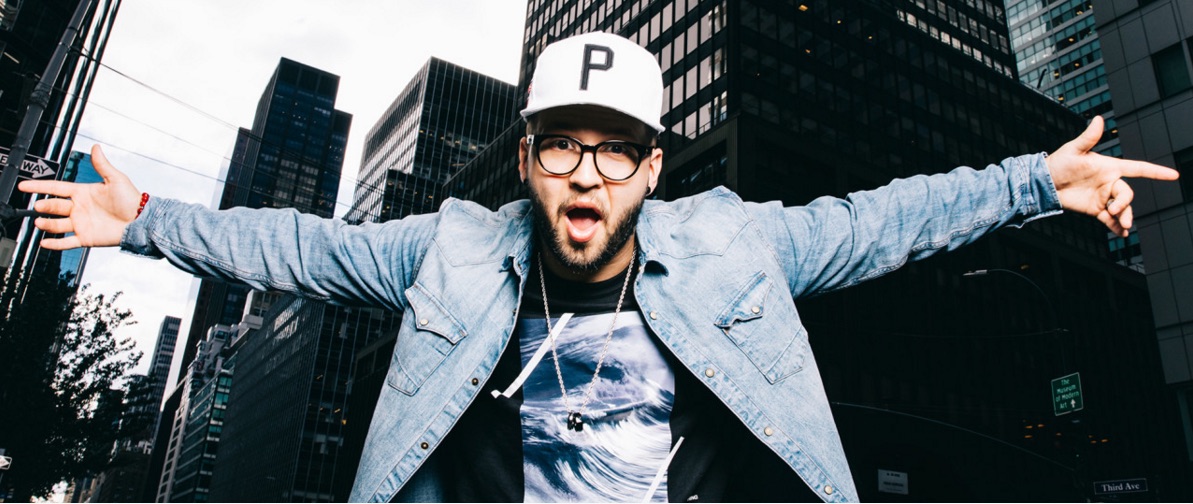Andy Mineo is making everyone uncomfortable. The New York City-based artist, who is known for his truth-telling lyrics and eclectic sound, has brought an even newer taste with his latest album, “Uncomfortable.” The album, which came out Sept. 18, debuted at No. 2 on the iTunes Hip-Hop/Rap charts.
Over the past few years Mineo, who is signed with music label Reach Records, has gained recognition and prominence in the music industry and has become a leading voice in the hip-hop world. Mineo’s debut album “Heroes for Sale” was number 11 on the Billboard Top 200 in 2013, and his 2014 follow-up EP, “Never Land,” sold over 25,000 digital copies in its first week. His artistry and message has brought together people from diverse backgrounds to share and experience music that challenges the norm of hip-hop.
Mineo is currently promoting his new album on the Uncomfortable Tour, where he is joined by fellow artists Propaganda and SPZRKT (pronounced Spazzy Rocket).
Mineo will be stopping in Columbus at 6 p.m. on Nov. 1 at Skully’s Music Diner as a part of the Uncomfortable Tour. I had an opportunity to interview Mineo to ask him questions about the changing music industry, the relationship between God and his music, and what tips he has for students to succeed in the music world.
Uele: How has the music industry changed from when you first started to where it is now?
Andy: The music industry. Even that phrase is kind of an evolving phrase, because the industry isn’t like a thing that’s out there in the world. It’s just whatever you make it. The music industry is a kid in his bedroom, on his laptop, making beats. When I got signed and started working with Reach Records, that was kind of beginning, and now it’s full blown. The streaming has taken off a lot since I got started in 2009/10 and that affected sales. I think people are getting more creative in the way that they’re able to monetize their artwork. It’s just kind of the uphill battle of the “music industry.”
Uele: How do you navigate your way through hip-hop?
Andy: Just make good music. That’s kind of it. If you’re making good art, your message is better accepted. If you make bad art, your message is marginalized. I’m just trying to be as honest with people as I can by interacting with them and building relationships with them. And I think as long as I make good music, those relationships will continue to grow.
Uele: Have you ever felt like you have had to compromise your faith in your music?
Andy: That’s one of the things that I pride myself on, is being able to make music and talk about the things that I talk about and be unashamed. I definitely don’t feel like I’ve compromised at all. I’ve begun to think differently about my music as I’ve grown and evolved as a person and wanting my music to be accessible to more people than just people who agree with me. I think there’s a consideration in the writing process of who the audience is and who the potential audience could be. But you just try to write as faithfully as you can inside of those parameters. Create good music that can inspire the Christian and inspire the non-Christian alike. Everyone can enjoy it. But I definitely wouldn’t create anything that goes against my values.
Uele: How are you bringing “Uncomfortable” into the real world?
Andy: Uncomfortable is a word that describes where I am in a lot of ways. As a Christian inside of a very un-Christian music industry; as a person who’s growing, changing, and evolving; as a man that just got married; and a young man dealing with success. Those are all just new and uncomfortable spaces to be in, and that’s kind of why I titled the record that. My life doesn’t make sense in a lot of ways and that’s why the album was given that name. But I also like that quote that says, “Good art should comfort the disturbed and disturb the comfortable.” And I think with my music I want to have meaningful conversations with people, or at least be the springboard for that. Hopefully this album will do that to the music industry, to the listeners, to the fans, [and] to the people discovering my music.
Uele: How do you keep Christ in your music, even when you don’t explicitly say His name?
Andy: I talk about a lot more than just that stuff. But I think the reason that I’m able to talk about some of those things is because I’m not a walking Bible rap. What’s actually happened is the principles and the ideas of my faith, which have been inspired by Jesus, have found their way into my life, and now I’m able to speak and create from a worldview, as opposed to just regurgitating things that I’ve heard before. I’m not out here rapping Bible verses. I’m actually rapping about how those Bible verses may have been applied to my life and changed the way I live my life. And now it begins a perspective out of that … Your relationship with God becomes real to you and it’s not just a segmented part of your life. It actually runs through your life. It’s going to come out in the way I love my wife, the way I handle money, the way I treat people, and the way I write music. It’s integrated into who I am as a person, and not just a gimmick that I use to create art.
Uele: What advice do you have for college students who want to break into the music industry? How can they have a successful career and fulfilling experience?
Andy: What’s interesting is [that] going to school typically doesn’t have as much to do with what you’re learning as much as it has to do with the people you’re meeting. People who are successful in the music industry are talented and good at making relationships with people. Nobody walks into a studio and says, “hey look at my degree, you should hire me!” Typically it’s someone who can work a soundboard and get stuff done. Be really good with people, work at your craft, build relationships and be excellent at what you do. Those are the things that are going to get your foot in the door of wherever you want to go, whether it be production, artistry, road managing, studio engineer. You have to get out there and meet people, excel in your job, and have them like you. That takes more than just filling out answers on a quiz at school. That takes personal dedication and growth—your commitment to growing as a person. Just keep going for it.


